Winds Of Qiyamah/Resurrection
(Reeh al-Qiyamah) Are Blowing!
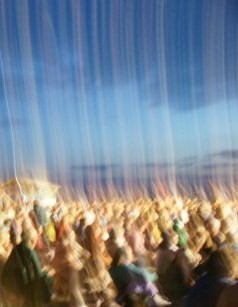
"When men are gathered together before God on the day of resurrection, everyone will be given the record of his deeds. When they see the list of their crimes and their sins, they will begin to deny them and they will refuse to confess. Then the angels will bear witness to those sins having occurred, but still the sinners will swear that they have done none of the deeds of which they are accused. This is referred to in the verse, `On the day when God shall resurrect them all and they will swear lyingly to God as they once swore lyingly to you' (58:18). It is then that God will place a seal on their tongues and cause their bodies to begin speaking about what they have done." (Tafsir al-Qummi, p. 552)
Even more remarkable is the fact that the deeds man has performed will themselves take shape before his astonished eyes. This must definitely be regarded as the most veracious form of testimony possible; it closes off before the offender any defense, deception or flight from chastisement, and strips him of denial and sophistry. No crime remain unproven, and the sinners will be overtaken by shame and humiliation." - Imam al-Sadiq
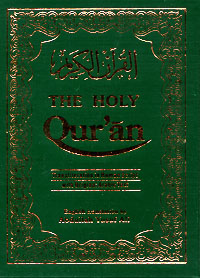
Even So Will The Winds Of Resurrection Blow
It is Allah who sends forth the Winds so that they raise up the Clouds, (3881)
And We drive them to a Land that is dead,
And revive the earth therewith after its death:
Even so (will be) the Resurrection!
surah 35:9 Fatir (The Originator of Creation)
"3881. The allegory here is double. (1) Dry, unpromising soil may seem, to all intents and purposes, dead; there is no source of water near; moisture is sucked up by the sun's heat in a far-off ocean, and clouds are formed; winds arise; it seems as if the wind "bloweth as it liseth," but it is really Allah's Providence that drives it to the dead land; the rain falls, and behold! There is life and motion and beauty everywhere! So in the spiritual world Allah's Revelation is His Mercy and His Rain; there may be the individual resurrection (Nushur) or unfolding of the soul. (2) So again, may be the general Resurrection (Nushur), the unfolding of a New World in the Hereafter, out of an old World that is folded up and dead."
Abdullah Yusuf Ali, The Holy Qur'an, 1989.
Jesus answered and said unto him,
Verily, verily I say unto thee, except a man born be born again,
He cannot see the Kingdom of God.
Nicodemus saith unto him,
How can a man be born again when he is old?
Can he enter the second time into his mother's womb, and be born?
Jesus answered: Verily, verily, I say unto thee,
Except a man born of water and the Spirit,
He cannot enter into the Kingdom of God.
That which is born of flesh is flesh and that which is born of Spirit is spirit,
Marvel not that I said unto thee: Ye must be born again.
The wind bloweth where it listeth, and thou hearest the sound thereof,
But cannot tell whence it comes and where it goeth:
So is every one that is born of the Spirit.
John 3:3-8
It is written both in the Qur’an and Bible that during Qiyamah (Resurrection) those who get their Self-Realization will have Cool Breeze or Wind (Reeh al-Qiyamah) coming out of their hands, head and other parts of the body. The "hands will speak" to inform the individual of any wrong-doing on a particular finger(s) which correspond to certain problems. This experience is part and parcel of the human subtle system which is activated after the Baptism of Allah (Self-Realization).
Prophet Jesus also preached that those born again of the Spirit will experience the Wind, but will have no idea where it comes from or goes, i.e., this is not the normal wind which humans daily experience but a Divine Wind from within.
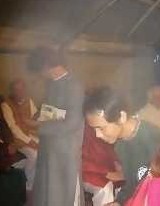
The word rûh comes from the same root as râhah. It is also related to rîh, which means 'wind', mirwahah, meaning 'fan', and istirwâh which means 'respiration'. The term "Spirit" translates the Hebrew word ruah, which, in its primary sense, means 'breath', 'air', 'wind'. Jesus indeed uses the sensory image of the wind to suggest to Nicodemus the transcendent newness of him who is personally God's breath, the divine Spirit. (Jn 3:3-8)
So how does one account for Cool Breeze blowing out of hands and head, especially during meditation which is a daily experience of all who surrender to the Great Announcement that Al-Qiyamah has begun? Maybe Sayyid Mujtaba Musavi Lari, son of the late Ayatullah Sayyid Ali Asghar Lari, one of the great religious scholars and social personalities of Iran, may have the answer in his "Testimony by the Most Veracious of Witnesses":
"The Noble Qur'an makes it clear that the testimony given by sinners in the court of divine justice will be utterly unique in nature, bearing absolutely no similarity to the juridical procedures of this world.
The verses of the Qur'an that speak of the giving of testimony on the day of resurrection proclaim that the hands, feet and even the skin of the sinners will disclose the hidden sins that they committed during their lives and that were previously unknown to all but God; the sinner will stand revealed, to his utter dismay and terror. The animation of these witnesses and the testimony they will bear to the events that have happened in the world show that all the deeds we perform are recorded both in the external world and in the various organs and limbs of our bodies. When the conditions of this world are replaced by those of the hereafter, on the day when, as the Qur'an puts it, "secrets are made manifest and none will be able to conceal anything or seek help from anyone." (86:9-10) all the deeds that have been recorded will pour forth and begin to bear witness.
We can indeed observe in this world a pale and feeble example of what is meant by things acquiring speech.
A doctor, for example, understands the language of the body. The rate of the pulse may indicate fever, and yellowness of the eye proclaims the presence of jaundice. To give another example, we can tell the age of a tree from the circles within its trunk.
It is nonetheless true that we cannot know the exact modality of the testimony that will be given in the hereafter. However, once the veil is lifted from men's sight, their power of vision will increase and their level of perception will be raised. They will embark on a new life with enhanced means of perception and will see many things that surrounded them in this world although they were unaware of them. Thus the Qur'an says:
"You were in a state of negligence; now We have lifted the veil from you so that your sight is today keen." (50:22).
Other verses speak of the multiplicity of the witnesses that will come forward:
"Let them fear a day on which their tongues, their hands and their feet shall bear testimony against them." (24:24).
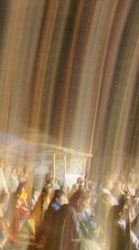
A day on which all the enemies of God will be drawn into the fire as they stand next to their destined abode, their ears, their eyes and the skin on their bodies shall testify to the sins they have committed. They will address their limbs in astonishment, saying, `How do you testify concerning our deeds' They will answer, `God who gave speech to all creatures has also given us speech. First He created you, and now He brings you back to Him. You concealed your ugly deeds not in order that your ears, eyes and skins should not give witness today, but because you imagined God unaware of what you hid from other men. It is this groundless assumption that has brought about your perdition, for today you are in the ranks of the losers." (41:19-23).
This verse stresses that man is unable, in the last resort, to conceal the sins he has committed with his limbs. This is not because he under estimates his bodily form, which in the end turns out to have been a means for recording his deeds, but because he imagines that things are essentially autonomous and that much of what he has done will be beyond the reach of God's knowledge. It is this unawareness of the fact that nothing in creation is hidden to God that casts men into the pit of eternal wretchedness.
The Qur'an further proclaims:
"Today We place the seal of silence on the mouths of the unbelievers and transgressors. Their hands shall speak to us, and their feet shall bear witness to what they have done." (36:65).
Imam al-Sadiq, upon whom be peace, said the following in clarification of this matter:
"When men are gathered together before God on the day of resurrection, everyone will be given the record of his deeds. When they see the list of their crimes and their sins, they will begin to deny them and they will refuse to confess. Then the angels will bear witness to those sins having occurred, but still the sinners will swear that they have done none of the deeds of which they are accused. This is referred to in the verse, `On the day when God shall resurrect them all and they will swear lyingly to God as they once swore lyingly to you' (58:18). It is then that God will place a seal on their tongues and cause their bodies to begin speaking about what they have done." (Tafsir al-Qummi, p. 552)
Irrefutable witness
Even more remarkable is the fact that the deeds man has performed will themselves take shape before his astonished eyes. This must definitely be regarded as the most veracious form of testimony possible; it closes off before the offender any defense, deception or flight from chastisement, and strips him of denial and sophistry. No crime remain unproven, and the sinners will be overtaken by shame and humiliation.
The Qur'an says:
"On the day of resurrection they will find whatever they have done confronting them." (18:49).
Or again:
"There will be a day on which everyone who has done a good deed will find it confronting him, and those who have done evil will wish that it were kept far distant from them. God warns you against His punishment for He is in truth compassionate toward His servants" (3:30).
Since it is impossible for deeds to disappear in the hereafter, the most that sinners can hope for is that a distance be maintained between them and their deeds, a clear expression of their disgust with what they them selves have done.
In addition to all the forgoing, and still more important than it, God describes Himself as the witness to all the deeds of men:
"Why do they not believe in the signs of God? He is a witness to all that you do." (3:98).
The Qur'an also mentions the prophets and those who have drawn close to God as witnesses to man's deeds:
"The earth will shine with the light of its Lord. The record of men's deeds will be brought forth and the prophets and the martyrs shall be summoned to bear witness and judge among men so that none shall be wronged." (39:69).
It should be borne in mind that such witness and testimony will not be restricted to the outer aspect of men's deeds. What is meant is rather testimony to the quality of deeds with respect to their good or their evil, and whether they represented obedience or sin: in short, the inner aspect of deeds.
The giving of witness on the day of resurrection is a sign of honor and respect for those who are called upon, but it also indicates that while in this world they had a certain awareness of men's inner beings, that they were able to observe them just like their outer beings and thus to record their deeds with precision and inerrancy. It is obvious that conventional knowledge and sense perception are quite inadequate for testimony of this kind; it depends on a more profound mode of awareness that is able to embrace the inner dimensions of man, an awareness that transcends our normal capacities and permits an unfailing distinction to be made between the pure and the impure.
Such testimony is based upon a clear vision of reality, and as such it is infallible.
The Qur'an says:
"Tell men that whatever they do God will display to them whatever they do, and the Messenger and the believers are aware of it. Then they shall return to God Who knows the hidden and the manifest, so that they will be requited for their good and their evil." (9:105).
According to commentaries on the Qur'an, what is meant here by "the believers" is the Inerrant Imams from the Household of the Prophet, peace and blessings be upon him and his family. They are distinguished from other Godfearing people by the special grace and favor they have received from in that they are both inwardly pure and have been utterly purified by God. It is for this reason that the giving of testimony in the hereafter has not been vouchsafed to all men of piety.
Imam al-Baqir, peace be upon him, said in a certain tradition:
"No group or class of men can bear witness to the deeds of men except the Inerrant Imams and the prophets of God. The generality of the community has not been described by God as witnesses, because in this world there are people whose testimony cannot be trusted even for a handful of grass." (Tafsir al-Mizan, Vol. I, p. 332)
All the deeds of men have a profound effect on their beings. If someone knows that injustice and crime are sinful but nonetheless engages in them at the behest of his instinctual nature, a contradiction will arise in his inner being that will burn and torment him profoundly. But is it not he who has created this contradiction?
If envy gnaws away at a man's inner being, is anyone responsible apart from himself?
Imam al-Sadiq, upon whom be peace, said:
"Sin cuts more deeply than a knife." (Bihar al-Anwar, Vol. LXXIII, p. 358)
All of our words and deeds are stored in the vast and mysterious archive of our body and our soul, and they will be brought forth in the tribunal of resurrection. The totality of our acts, good and bad, are stored up within us and will ultimately take shape to confront us.
The reckoning of men's deeds that will take place in the hereafter will, then, be utterly unique. No one may hope to obfuscate the truth or to deny the contents of the precise record that is laid before him. Everyone will be compelled to accept the truth and to submit to its consequences. The hands, the feet and the skin will be called on to give witness; God from Whose knowledge not at single atom in the heavens and earth is hidden and Who is aware of the falling of leaf from a tree, will also be a witness; and the prophets and the Imams will bear their witness to whatever we have wrought.
It is obvious that it is impossible for us now to understand and perceive fully all these dimensions of the inevitable reckoning that will follow resurrection."
This Wind of Qiyamah now flowing from their limbs is the undeniable evidence that they are being resurrected and cleansed of all evil within, and will also bear witness in the Hereafter.
"All of our words and deeds are stored in the vast and mysterious archive of our body and our soul, and they will be brought forth in the tribunal of resurrection. The totality of our acts, good and bad, are stored up within us and will ultimately take shape to confront us."
This Wind of Qiyamah is the indisputable Sure Sign that Qiyamah — Allah's Glad Tidings of Compassion and Mercy to all humankind — has begun. The Wind of Allah that will issue forth from the True Believers (Al-Mu’minun) is unquestionable proof that Qiyamah has commenced on Earth, and in the Hereafter will be the most veracious of witnesses! No Muslim, Jew, Christian, Hindu, or Buddhist can deny or defy the Great News (surah 78:1-5 An-Naba) of Qiyamah now!
We only send the apostles to give Glad Tidings and to give warnings: But the unbelievers dispute with vain argument, in order therewith to weaken the truth, and they treat My Signs as a jest, as also the fact that they are warned!
And who doth more wrong than one who is reminded of the Signs of his Lord, but turns away from them, forgetting the (deeds) which his hands have sent forth? Verily We have set veils over their hearts lest they should understand this, and over their ears, deafness, if thou callest them to guidance, even then will they never accept guidance.
surah 18:56-7 Muhammad
(Abdullah Yusuf Ali, The Holy Qur’an, 1989.)
But they are prophesied to dispute it:

Concerning the Great News [5889] about which they cannot agree.
Verily, they shall soon (come to) know!
Verily, verily they shall soon (come to) know!
surah 78:1-5 Al Naba' (The Great News)
"5889. Great News: Usually understood to mean the News or Message of the Resurrection."
surah 78:1-5 Al Naba' (The Great News)
Abdullah Yusuf Ali, The Holy Qur’an
Of what do they question one another?
Of the Mighty Tiding
Whereon they are at variance.
No indeed; they shall soon know!
Again, no indeed; they shall soon know.
surah 78:1-40 Al Naba' (The Tiding)
Arthur J. Arberry, The Koran Interpreted
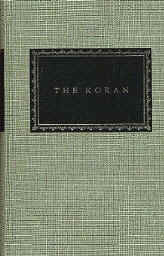
Of the great NEWS,
The theme of their disputes.
Nay! They shall certainly know its truth! Again.
Nay! They shall certainly know it.
surah 78:1-5 The News
J.M. Rodwell, The Koran
Of what are they asking one another?
(Is it) of the Great Announcement
About which they have been differing?
Indeed they will come to know soon;
They will indeed come to know soon.
surah 78:1-5 The Announcement (An-Nabi)
Ahmed Ali, Islam: The Qur’an
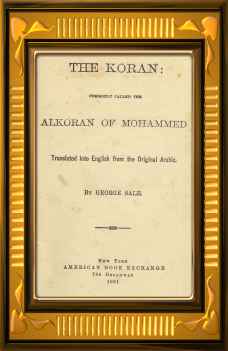
About the Great Event,
About which they differ?
Nay! they shall soon come to know.
Nay! Nay! they shall soon know.
surah 78:1-5 Al Naba
Muhammed Shakir, The Holy Qur'an
Of what ask they of one another?
Of the great NEWS, the theme of their disputes.
Nay! they shall certainly know its truth!
Again. Nay! they shall certainly know it.
surah 78:1-40 Al Naba' (The News)
J.M. Rodwell, The Koran
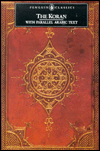
(Is it) of the Great Announcement, about which they have been differing?
They will indeed come to know soon;
They will indeed come to know soon.
surah 78:1-40 Al Naba' (The Announcement)
Ahmad Ali, Islam: The Qur'an
What are they questioning?
The Great Event that is disputed by them.
Indeed, they will find out.
Most assuredly, they will find out.
surah 78:1-5 Al Naba' (The Event)
Rashad Khalifa, Quran: The Final Scripture

78:1 Of what do they ask one another?
78:2 Of the Tremendous Announcement
78:3 About which they differ.
78:4 Nay, they will soon know;
78:5 Nay, again, they will soon know.
The Holy Quran, Chapter 78
Al-Naba: THE ANNOUNCEMENT
http://www.seventhfam.com/
[78:0] In the name of God, Most Gracious, Most Merciful
[78:1] What are they questioning?
[78:2] The Great Event.
[78:3] That is disputed by them.
[78:4] Indeed, they will find out.
[78:5] Most assuredly, they will find out.
Sura 78 The Event (Al-Naba')
http://www.submission.org/
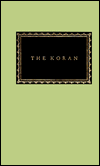
[78:1] What are they questioning?
[78:2] The Great Event.
[78:3] That is disputed by them.
[78:4] Indeed, they will find out.
[78:5] Most assuredly, they will find out.
Sura 78 The Event (Al-Naba´)
http://www.quranbrowser.org/
Allah in the name of the Most Affectionate, the Merciful.
1. What they are questioning for among themselves?
2. About the Great News.
3. In which they differ.
4 Yes, they will now know.
5. Again, yes, they will soon know.
SURAH AL-NABA (The Great News)
http://trueteacher.bizland.com/
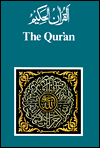
78:1 What are they questioning?
78:2 The Great Event.
78:3 That is disputed by them.
78:4 Indeed, they will find out.
78:5 Most assuredly, they will find out.
Sura 78: The Event (Al-Naba')
http://www.quranbrowser.org/
In the name of Allah, the Beneficent, the Merciful.
1. Of what do they ask one another?
2. Of the Tremendous Announcement
3. About which they differ.
4. Nay, they will soon know;
5. Nay, again, they will soon know.
Chapter 78: (Al-Naba' - The Announcement)
http://aaiil.org/
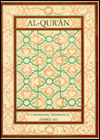
[78:1] What do they question one another about?
[78:2] About the Mighty Event,
[78:3] Concerning which they differ.
[78:4] Nay, soon they will come to know.
[78:5] Nay, We say it again, they will soon come to know.
The Holy Quran : Chapter 78: Al-Naba'
http://www3.alislam.org/
Allah - beginning with the name of - the Most Gracious, the Most Merciful
[Naba 78:1] What are they questioning each other about?
[Naba 78:2] About the Great Tidings!
[Naba 78:3] Regarding which they hold different views.
[Naba 78:4] Surely yes, they will soon come to know!
[Naba 78:5] Again surely yes, they will soon come to know!
AL NABA (THE TIDINGS)
http://aqibfarid.tripod.com/
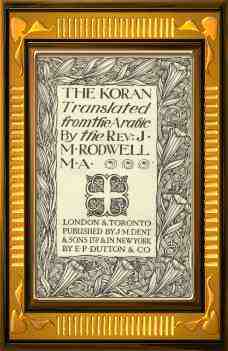
078.002 Concerning the Great News,
078.003 About which they cannot agree.
078.004 Verily, they shall soon (come to) know!
078.005 Verily, verily they shall soon (come to) know!
Surah 78 - Al Naba' THE GREAT NEWS
http://www.jannah.org/
In the name of Allah, the Compassionate, the Merciful.
[78.1] Concerning what are they disputing?
[78.2] Concerning the Great News,
[78.3] About which they cannot agree.
[78.4] Verily, they shall soon (come to) know!
[78.5] Verily, verily they shall soon (come to) know!
AN-NABA (THE TIDINGS)
http://www.agnatemoslem.com/
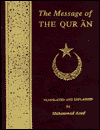
[78.1] What do they question each other about!
[78.2] About the Great News
[78.3] whereupon they are at variance?
[78.4] Indeed, they shall know!
[78.5] Again, indeed, they shall know!
The News - An-Naba'
http://www.idleb.com/
In the name of Allah, the Beneficent, the Merciful.
Of what do they ask one another?
Of the Tremendous Announcement bout which they differ.
Nay, they will soon know;
Nay, again, they will soon know.
The Holy Quran, Chapter 78 Al-Naba: THE ANNOUNCEMENT www.seventhfam.com
WA-LAA UQSIM BI-AN-NAFSAL-LAWWAAMAH
I do call to witness the Resurrection Day;
And I do call to witness the self-reproaching Spirit.
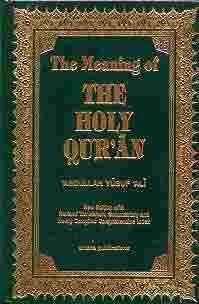
Concerning what are they disputing?
Concerning the Great News. [5889]
About which they cannot agree.
Verily, they shall soon (come to) know!
Verily, verily they shall soon (come to) know!
surah 78:1-5 Al Naba' (The Great News)
"5889. Great News: usually understood to mean the News or Message of the Resurrection."
Abdullah Yusuf Ali, The Holy Qur'an, Amana Corporation, 1989.
Types of Kufr (Disbelief) — Adapted from 'Tafseer ibn Katheer'
1. Kufrul-'Inaad: Disbelief out of stubbornness;
2. Kufrul-Inkaar: Disbelief out of denial;
3. Kufrul-Kibr: Disbelief out of arrogance and pride;
4. Kufrul-Juhood: Disbelief out of rejection;
5. Kufrul-Nifaaq: Disbelief out of hypocrisy;
6. Kufrul-Kurh: Disbelief out of detesting any of Allah's commands;
7. Kufrul-Istihzaha: Disbelief due to mockery and derision;
8. Kufrul-I'raadh: Disbelief due to avoidance;
In Abdullah Yusuf Ali's commentary Kufr, Kafara, Kafir, and derivative forms of the word imply a deliberate rejection of faith, revelation and truth of the Holy Qur'an: "The culmination of Allah's Revelation is in the Qur'an, which confirms previous scriptures, corrects the errors which men introduced into them, and explains many points in detail for all who seek right worship and service to Allah—whether they inherit the previous Books or not. It is a universal Message ... The worst and most hardened sinner is the man to whom Allah's Signs are actually brought home and who yet prefers Evil and turns away from the Light of Allah. The Signs may be in the words and guidance of a great Teacher or in some sorrow or warning, but from which he deliberately refuses to profit. The penalty—the Nemesis—must necessary come eventually."
According to Ibn Taymiyah (1263 – 1328) "kufr is the attribute of everyone who rejects something that God has commanded us to believe in, after news of that has reached him, whether he rejects it in his heart without uttering it, or he speaks those words of rejection without believing it in his heart, or he does both; or he does an action which is described in the texts as putting one beyond the pale of faith."
However, this explanation of kufr is most lucid and applicable to the sheer gravity, importance, and dire consequences of this universal Message of Al-Qiyamah (The Resurrection): "Just as faith for Muslims has to do not with believing but with knowing, so kufr, rejection, is not a lack of belief, not an intellectual position that holds that something is otherwise than is the case, and certainly it is not mere ignorance. Rather it, too, like its correlative iman, presupposes knowledge; for it is an active repudiation of what one knows to be true. This is why it is a sin, and indeed a (the) monstrous sin. It is the one final, cosmic (or some would say, the one final human) wrong; the deliberate saying of 'no' to what one knows to be right." (Wilfred Cantwell Smith, On Understanding Islam: Selected Studies, 1981, page 154)
Therefore most of the Al-Kufr ul Akbar (major disbeliefs) are applicable to those rejecting or disbelieving Allah's (SWT) Signs and surahs upholding the collection, promulgation, recital, explanation and warning of the following:
i) His Call to witness Al-Qiyamah (The Resurrection);
ii) His Call to witness His Ruh (self-reproaching Spirit);
iii) His Call to heed Al Naba (The Great News);
iv) His Call to participate in Al Qadr (The Night of Power and Destiny);
v) His Call to confirm His Revelations, Signs, and Warnings (of i-iv).
Thus kaffir (non-believer) here is applied to all humankind, both Muslim and non-Muslim, who reject the Call that God has commanded us to believe in after His Revelations, Signs and Warnings have reached us. The Qur'an clearly warns that many will disbelief, even mock, the Great News and Sure Signs of Al-Qiyamah.
So be forewarned, and in the Hereafter never deny deliverance of this clear Warning: "O ye assembly of Jinns and men! came there not unto you messengers from amongst you, setting forth unto you My signs, and warning you of the meeting of this Day of yours?" Qur'an 6.130
And those still rejecting, hesitant or unable to make up their minds even after hearing the Great News and shown the Signs, Allah (SWT) questions: "Are they waiting until the Hour comes to them suddenly? All the Signs thereof have already come. Once the Hour comes to them, how will they benefit from their message?" "Why do they not study the Quran carefully? Do they have locks on their minds?" Qur'an 47:18-24
The last paragraph is yet another warning from Allah (SWT) that prior to the Wrath of the End (Al Qariah) humans are offered the Mercy of the Resurrection (Al Qadr). And once the Hour of Al Qariah comes to them, how will they benefit from their contemporary message of Al Qadr i.e., from the Great News of the messengers from amongst you? How will those reading these lines benefit if they continue to doubt and wait, and the Striking Day comes suddenly? What use then will be the Mercy and Compassion of Al Qadr (Night of Destiny) if the morn of the Al Qariah (Striking Day) ends His Peace? Why doesn't the Ummah then not study the Quran with painstaking effort to avoid the errors, mistranslation and ignorance of the ulema that have presently paralyzed their minds from believing the Great News? Why don't they use their own mental faculties and intelligence to understand Al- Qiyamah, the heart and soul of the living, breathing Quran? Living and breathing because God Almighty is now talking directly to you through His Holy Book! After all, it is Allah (SWT) who has now called out to all Believers with this Decree: "I do call to witness the Resurrection Day; And I do call to witness the self-reproaching Spirit." He is specifically addressing you in particular (and Believers is general) to do so!
Only now in this modern age of universal education, mass media and publishing technology—after 14 centuries and unlike the illiterate past—is it possible to own and be sufficiently literate to "study the Quran carefully" in languages they understand best.* And just in case the Believers start studying the entire Qur'an, it must be stressed that Allah (SWT) is referring specifically to those eschatological Signs and surahs upholding His Call to bear witness of the Resurrection! They must thoroughly examine and understand the Signs that have already manifested, and set forth by messengers from amongst themselves.
Without question, to "study the Quran carefully" means using one's own mental faculties, not those of the ulema (Muslim clergy) who have for centuries put "locks on their minds" and are the very reason for theUmmah's present predicament i.e., their unprecedented kaffir-like mindset, reaction, rejection and mocking of His Call, Signs and Great News of the Resurrection. They must know that during Al Qadr no 'graves are going to open up' as this is His Night of Compassion and Mercy. So "Peace!... This until the rise of the morn!" (Quran 97:5)
No comments:
Post a Comment